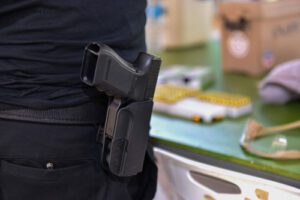 The District Court continued: 3. Subpart 17 – Entertainment Facilities As an initial impression, subpart 17 of the legislation is exceptionally broad, which makes it is a criminal offense to carry handguns in “a privately or publicly owned and operated entertainment facility within this State, including but not limited to a theater, stadium, museum, arena, racetrack or other place where performances, concerts, exhibits, games or contests are held.” 2022 N.J. Laws c. 131 § 7(a). First, the Second Amendment’s plain text covers the conduct in question (carrying a concealed handgun for self-defense in public). As a result, Defendants must be able to rebut the presumption of protection against this regulation by demonstrating that the regulation is consistent with this Nation’s historical tradition of firearm regulation. The historical laws Defendants rely upon generally restrict firearms in places “where crowds gather.” [State’s Br. at 29.]
The District Court continued: 3. Subpart 17 – Entertainment Facilities As an initial impression, subpart 17 of the legislation is exceptionally broad, which makes it is a criminal offense to carry handguns in “a privately or publicly owned and operated entertainment facility within this State, including but not limited to a theater, stadium, museum, arena, racetrack or other place where performances, concerts, exhibits, games or contests are held.” 2022 N.J. Laws c. 131 § 7(a). First, the Second Amendment’s plain text covers the conduct in question (carrying a concealed handgun for self-defense in public). As a result, Defendants must be able to rebut the presumption of protection against this regulation by demonstrating that the regulation is consistent with this Nation’s historical tradition of firearm regulation. The historical laws Defendants rely upon generally restrict firearms in places “where crowds gather.” [State’s Br. at 29.]
However, the Court finds that the historical analogues Defendants rely on do not support the specific restricted locations as set forth in the legislation. Defendants’ reliance on a 1786 Virginia law is faulty as it cites only half of the statute. The statute prohibited a person from “riding by night or by day in fairs or markets, in terror of the county.” 1786 Va. Laws 25 (emphasis added). [Docket No. 20, Ex. 6.] Thus, it is the conduct of terrorizing the county, not the possession of a firearm in fairs or markets, that the statute prohibited. This historical analogue is inapposite. Indeed, the Bruen Court considered this same statute, explaining that it falls within a category of laws for which a common theme is to “prohibit bearing arms in a way that spreads ‘fear’ or ‘terror’ among the people.” Bruen, 142 S. Ct. at 2145. Thus, this historical law concerns “something more than merely carrying a firearm in public.” Id. Instead, the historic Virginia statute criminalizes the underlying conduct at issue.
As for the 1870 Texas statute relied upon by Defendants that prohibited firearms in a “ball-room, social party, or social gathering,” the statute, in addition to likely being an outlier (see Bruen, 142 S. Ct. at 2153), expressly exclude[d] from application “persons authorized or permitted by law to carry arms at the places.” Art. 320, Tex. Act of April 12, 1871. [Docket No. 20, Ex. 9.] The challenged law here has no similar exclusion that would presumably apply to the Plaintiffs here, and thus, the statute is distinguishable.
Once again Judge Bumb does a good job pointing out the half-truths that the government attempted to use to support their position. If the Government’s position were adopted with regard to this broad category of venues, it would have undermined the right to carry a firearm that was at the heart of the Bruen decision.
